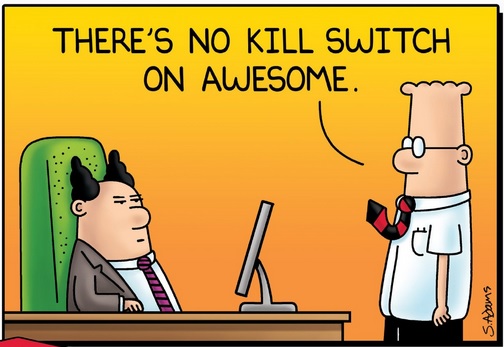You know what one of the greatest things about firing or laying someone off is? The free crap people just leave in their desks when they leave!
Someone at my company left a long time ago and left this ladies brown, kind of chunky, cardigan sweater. It was one of those that was really comfortable, but not the best looking. That thing just gets passed around amongst any of the ladies who are cold.
I had to pack up the desk of a guy who was fired for performance once and found an almost full fifth of vodka. That was a really nice find! And probably the reason his performance wasn’t so good. Sure you get a ton of pens, staplers, tape dispensers, etc. Office supplies seem to be the bulk of finds.
At one employer I was at after a major layoff the head of HR had what was left of our HR team go collect all the office supplies from all the empty desks. There was over a hundred people left go that day and the mountain of office suppliers was enormous! We could have opened our own Office Max!
Office lunch and snacks are probably the second most left item. You can a lot of microwavable soups and such. Candy. Crackers. Chips. Don’t think that stuff gets thrown away! Office workers are a direct descendant of Piranhas! You throw random desk food into a break room and that stuff is gone in minutes.
There tends to be a lot of business books left in offices and cubes after someone leaves. I guess that 7 Habits and Good to Great weren’t working so well, so why take them along with you. I, myself, have an entire bookshelf in my office of business books that I’ve read over the past two decades. I really don’t need them anymore, now they’re basically decoration. I also have three text books from my master’s HR program that I’ll never crack open. keeping those were a solid choice.
The one thing you can count on is there are always some clues left behind of why the person is no longer with you, especially those who are terminated. Usually, you find something thing that helps this person waste eight hours per day. Crossword books, magazines, video game console, workout bands, etc., basically anything you can do at work, except work.
Half used calendars are another thing people tend not to take with them on their journey through life. I could make an entire memorial of past employees by just pinning up their cat and muscle car calendars. Nothing shows appreciation and tenure like August’s motivational quote of the month!
Of all the random shit past employees leave us, it’s the stories that are the best. I think you can measure your impact on an organization by the number of stories you leave behind. If you go to a group lunch or office party, a year later, and there are no stories being shared about you, you probably didn’t have much impact.
What’s your best shit that people left behind?

